
The true finches are small to medium-sized passerine birds in the family Fringillidae. Finches generally have stout conical bills adapted for eating seeds and nuts and often have colourful plumage. They occupy a great range of habitats where they are usually resident and do not migrate. They have a worldwide native distribution except for Australia and the polar regions. The family Fringillidae contains more than two hundred species divided into fifty genera. It includes the canaries, siskins, redpolls, serins, grosbeaks and euphonias, as well as the morphologically divergent Hawaiian honeycreepers.

Serinus is a genus of small birds in the finch family Fringillidae found in West Asia, Europe and Africa. The birds usually have some yellow in their plumage. The genus was introduced in 1816 by the German naturalist Carl Ludwig Koch. Its name is Neo-Latin for "canary-yellow".
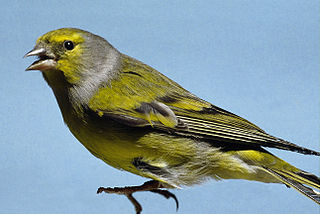
The citril finch, also known as the Alpine citril finch, is a small songbird, a member of the true finch family, Fringillidae.

The oriole finch is a small passerine bird in the finch family. It is found in Africa and is native to Burundi, Cameroon, Democratic Republic of the Congo, Equatorial Guinea, Kenya, Malawi, Nigeria, Rwanda, South Sudan, Tanzania and Uganda. It lives in subtropical or tropical moist evergreen montane forests.
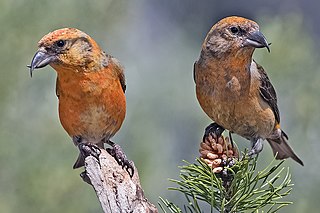
The cardueline finches are a subfamily, Carduelinae, one of three subfamilies of the finch family Fringillidae, the others being the Fringillinae and the Euphoniinae. The Hawaiian honeycreepers are now included in this subfamily. Except for the Hawaiian honeycreepers which underwent adaptive radiation in Hawaii and have evolved a broad range of diets, cardueline finches are specialised seed eaters, and unlike most passerine birds, they feed their young mostly on seeds, which are regurgitated. Besides this, they differ from the other finches in some minor details of their skull. They are adept at opening seeds and clinging to stems, unlike other granivorous birds, such as sparrows and buntings, which feed mostly on fallen seeds. Some members of this subfamily are further specialised to feed on a particular type of seed, such as cones in the case of crossbills. Carduelines forage in flocks throughout the year, rather than keeping territories, and males defend their females rather than a territory or nest.
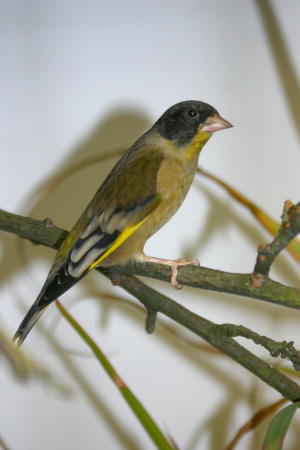
The black-headed greenfinch is a small passerine bird in the family Fringillidae. It is found in the Chinese province of Yunnan, northern Laos, eastern Myanmar and adjacent areas of Vietnam, Thailand and Northeast India. Its natural habitats are subtropical or tropical dry forest and subtropical or tropical dry shrubland.

The yellow-faced siskin is a species of finch in the family Fringillidae. It is found in Brazil and Venezuela.
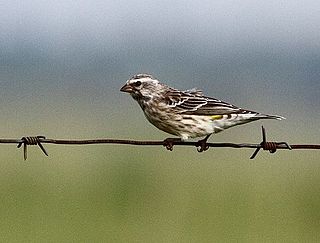
The black-throated canary, also known as the black-throated seedeater, is a species of finch in the family Fringillidae.

The lemon-breasted canary, also known as the lemon-breasted seedeater, is a species of finch in the family Fringillidae. It is found in Malawi, Mozambique, South Africa, Zambia, and Zimbabwe. Its natural habitats are dry savannah, subtropical or tropical dry shrubland, and rural gardens.

The Yemen serin is a species of finch in the family Fringillidae. It is found in Oman, Saudi Arabia, and Yemen.

The Arabian serin or olive-rumped serin, is a species of finch in the family Fringillidae. It is native to the Sarawat Mountains of western Saudi Arabia and Yemen. Its natural habitats are subtropical or tropical dry forest and subtropical or tropical dry shrubland.
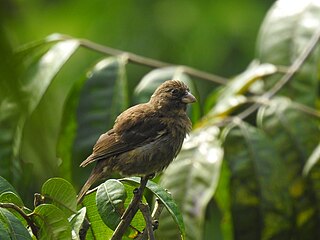
The Príncipe seedeater is a species of finch in the family Fringillidae. It is found only on the islands of São Tomé and Príncipe off the west coast of Africa. Its natural habitats are subtropical or tropical dry forest and subtropical or tropical moist lowland forest.
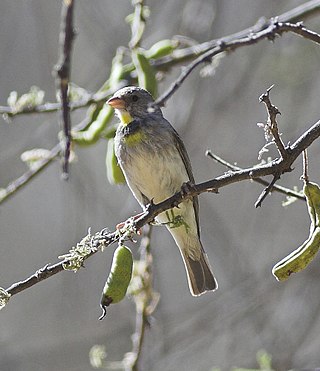
Salvadori's seedeater or Salvadori's serin is a species of finch in the family Fringillidae. It is found only in Ethiopia. Its natural habitats are subtropical or tropical dry forest and subtropical or tropical high-altitude shrubland. It is threatened by habitat loss.
The yellow-rumped seedeater, yellow-rumped serin or Abyssinian yellow-rumped seedeater is a species of finch in the family Fringillidae. It is native to the Ethiopian Highlands. Its natural habitat is subtropical or tropical dry shrubland.

Reichenow's seedeater is a species of finch in the family Fringillidae. It is sometimes considered conspecific with the black-throated canary.

The greenfinches are small passerine birds in the genus Chloris in the subfamily Carduelinae within the Fringillidae. The species have a Eurasian distribution except for the European greenfinch, which also occurs in North Africa.

Crithagra is a genus of small passerine birds in the finch family (Fringillidae). They live in Africa and Arabia.

Chrysocorythus is a genus of finches in the family Fringillidae.

Spinus is a genus of passerine birds in the finch family. It contains the North and South American siskins and goldfinches, as well as two Old World species.
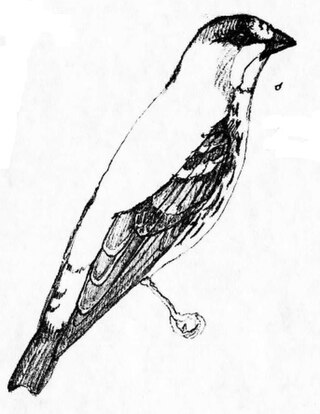
The Mindanao serin is a species of finch in the family Fringillidae.





















